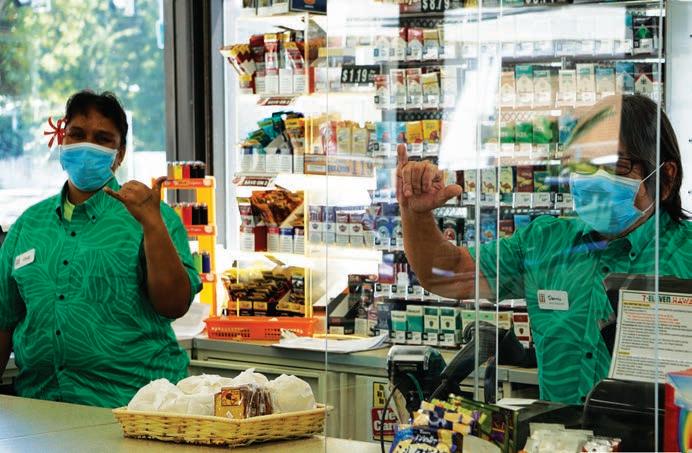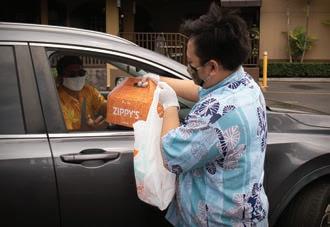
7 minute read
The Frontlines of Food
Retailers Keep Hawaii Fed During the Crisis
BY ALEXIS CHAPMAN
Advertisement
At HFIA we often say, “our members take great pride in feeding our state.” The job of keeping our state fed has never been more challenging, or more important. As the world has come to appreciate how essential food workers and the food industry are, food retailers have stood on the front lines. Our member retailers have had to quickly adapt to new consumer demands, new government regulations and safety recommendations, all of which have changed multiple times in a matter of weeks. They’ve found and created imaginative solutions, and worked to create the best ways to keep Hawaii fed while keeping their employees, customers, and communities safe. As our State’s unemployment rates have climbed to the highest in the nation, with more than 1 in 3 Hawaii residents out of work, our food industry has also continued to provide jobs and proven what an essential economic driver we are in Hawaii.
Retailers Become Safety Leaders
In the early stages of the pandemic, information on the best ways to stop the spread seemed to be coming from all sides at once, with little agreement. New recommendations and regulations were coming from Federal sources, the State, and the Counties, often with just a few hours warning. Retailers have stepped up not only to ensure compliance but to set the standards for safety. During a Honolulu Council hearing for a resolution urging stores to enact strict measures to slow the spread of the virus, Council Member Ron Menor praised Foodland for taking the initiative to put a policy in place requiring masks before it was mandated by the state.
In late March and early April Times created new fl oor markings to help customers maintain social distancing and ended the use of reusable bags to help protect employees and customers. Many retailers like KTA took initiative early to designate special kapuna only shopping hours. Safeway created a range of “contact free” procedures for their team. Tamura Enterprises found ways to keep cashiers safer by installing shields. Throughout the crisis, all our members have shown an overwhelming willingness to do whatever they can to keep their customers and employees safe.
Gratitude
Convenience stores like 7-Eleven Hawaii play a unique role in the neighborhoods they serve, for many people these are the only food stores they can access without having to take public transportation. In order to retain a sense of normalcy 7-Eleven Hawaii committed to staying open 24/7 throughout the crisis. They worked with their vendor partners to overcome challenges and ensure they had enough cleaning supplies and face coverings. Through it all their actions have been guided by a great sense of gratitude. Edna Ching, Marketing Manager, explained how that sentiment moves them forward.

7-Eleven cashiers
“We appreciate and value our Store Teams for being on the frontline for 7-Eleven Hawaii. They have shown great strength in their commitment to serving our customers, many of whom are like family. It is a rewarding feeling to be able to serve our customers. They have expressed deep gratitude that our stores remain open for them. We also want to reciprocate that appreciation. Their continued support and trust in 7-Eleven Hawaii is what keeps us going.”

Tamura Super Market masked stocker
Meeting Customer Needs
When the pandemic hit, Down to Earth realized very quickly that it would require innovative and adaptive strategies. By combining new tech solutions like online ordering, with the power of their dedicated staff , they’ve helped ensure that their customers can get what they need in the safest way possible. Alison Riggs shared a story that illustrates how Down to Earth’s essential workers have met the challenge.
“Last month, when our Down to Earth stores had just begun our personal shopper option in response to COVID-19, a kupuna customer at our Kailua store picked up some grocery and deli foods at the curbside. One bag of groceries was inadvertently missed and the kupuna customer drove home without it. One of our team members realized the error right away and decided to just jump in his car to deliver the missed bag. The customer was delighted and really blown away by the Down to Earth team member’s quick thinking and compassion so she didn’t have to take the exposure risk of going out again.”

PHOTO COURTESY KTA
In it Together
In many ways the community on Molokai is like one big family. And when the coronavirus came to the island they acted like a family and took care of each other. When an employee of Friendly Market tested positive for COVID-19, owner Kit Okimoto worked to ensure that all his employees had access to testing. He also made the diffi cult decision to close for two weeks to sanitize and not take any chances with the spreading the virus. During that time Kit communicated and worked with his main “competitor” on Molokai, Kevin Misaki, to help make sure that Misaki’s grocery store had what they needed to provide for the community. The team at Misaki’s stepped up to the added responsibility, working double shifts to fulfi ll orders and Kevin himself took to the sidewalk to provide hand sanitizer to customers waiting in line. Friendly Market has reopened, and though the virus remains a concern on Molokai Kevin remarked that, “everyone is starting to feel a little better, because we’re all family, it’s nice to know that.”
Embracing Change
For Zippy’s the COVID-19 pandemic has impacted every single area of their operations. They’ve moved staff around, retrained people in new jobs, closed dining rooms, started contactless delivery, adjusted the menu, implemented new cleaning procedures and mask protocols, and even off ered some staple goods for sale along with meals to help customers minimize trips out of the house. Paul Yokota, President of FCH Enterprises, found that rather than fi ghting and fearing change they needed to be willing to try new things and keep adapting. “What’s made me hopeful is that our staff has been newly energized by all the changes we’re making at a rapid-fi re pace.” Zippy’s commitment to trying new ideas has enabled them to keep serving their customers, keep employing their staff, and keep being an essential economic driver in the state. Paul emphasized some things that have stayed the same, “What did not change is our commitment to using local products when viable. We have continued our purchase of thousands of pounds of local ground beef each week, bread from local providers, island blend coffee, and eggs from local farms. We still believe that the best way for our community to recover is to ensure that local companies help each other out first.”

Above: Zippy’s contactless pickup
PHOTO COURTESY ZIPPY’S
Learning from the Challenges
At the onset of the pandemic many customers feared that their local stores would close, which spurred some panic buying and hoarding. Having grocery stores designated as essential businesses helped assuage fears of closure, and our member businesses and HFIA continue to work together to assure the public that stores will not run out of essential items. As the situation moves forward businesses and consumers are adjusting to the new normal. Like all businesses Tamura Super Market had to react to the fl uid situation that the pandemic created. At fi rst they found it hard to source certain items, but by April they were able to provide consistent stocks of PPE for staff and customers. While everyone looks forward to a more open economy there is also a realization that certain aspects of the pandemic will not go away any time soon, and the knowledge that this is not the last challenge our members will face. Charlie Gustafson, Vice President of Operations at Tamura Super Market and Vice Chair of HFIA observed, “I think some hard lessons were learned by everyone in this ongoing crisis, however, we will adapt and change for the better. I believe as a company we’re coming out of this situation much more prepared to handle a future event like this.”
Our member retailers have always been integral parts of their communities, and during this time they have been truly vital. Restaurants, bakeries, convenience stores, and grocers, from the smallest single outlet to our biggest member chain, these businesses and their employees have stood on the front lines of the fi ght to keep Hawaii fed. We have always known that our members are essential, and we know that when this virus is long gone these businesses will still be here working hard to keep their communities and our state fed, healthy, employed, connected, and strong.










